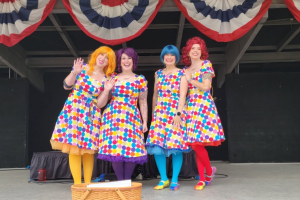Churches washing feet as witness
Published 9:00 pm Friday, April 7, 2006
As they prepared for the holy ritual, the churchgoers had all the essential items: latex gloves, nail clippers, chlorine and antibacterial soap. The only things missing were the feet, and soon enough they poured into the church by the dozen.
Many were callused and cracked from cold nights spent on the streets. Some were sore and infected. What they needed was some old-school – we’re talking centuries here – Christian doctrine in action. So volunteers at Centenary United Methodist Church in Richmond, Va., got down on their knees and scrubbed.
The practice of foot-washing, rooted in the biblical account of what Jesus did for his disciples, has ebbed and flowed throughout church history, abandoned at various times for reasons of dogma or embarrassment. But in recent years it has grown in popularity as an act of submission, both at Easter season services and in many other settings.
Homeless shelters from Berkeley, Calif., to Atlanta to Virginia Beach have added foot-washing to their services for the poor. Men and women wash each other’s feet in wedding ceremonies and marriage counseling. In Congress, a U.S. senator once washed the feet of an aide in a show of gratitude.
The action is as soul-wrenching and relevant in today’s culture as ever, theologians say.
Modern-day foot-washers, however, still must overcome age-old issues of awkwardness, hygiene and, occasionally, odor.
“There are a lot of things you don’t think about at first, like the logistics,” said Polly Chamberlain, 51, who began the foot-washing ministry in Richmond last year.
She got the idea while working in the church’s soup kitchen, where she felt a huge disconnect between the volunteers and the homeless people they served.
“How can we really care about them when we don’t even know them?” she asked. So she and others started washing the feet of the city’s poorest every Friday before lunch, as a way to break the ice. The goal was to bond with their patrons profoundly, show them someone cared and, by doing so, recapture the spirit of Jesus.
According to the Gospel of John, Jesus shocked his disciples at the Last Supper by getting up from the dinner table, wrapping a towel around his waist and washing their feet in a basin. “I have set you an example,” he said, “that you should do as I have done for you.”
Ever since, scholars have debated whether he meant it literally.
In the Catholic Church, the ritual fell out of favor until it was restored in 1955 by Pope Pius XII, who said it should be practiced on Maundy Thursday, three days before Easter. In most other Christian denominations, foot-washing was similarly sporadic and never achieved the sacred status of such rites as communion and baptism.
“It’s a curious thing because, if you listen to what Jesus said, it certainly sounds like a commandment,” said Samuel Wells, a minister at Duke University. “But feet are an uncomfortable thing and, for many, too intimate.”
Last year, when he was installed as Duke’s chapel dean, Wells insisted on washing the feet of students, housekeeping staff and colleagues at the ceremony.
Although there are no statistics on foot-washing, religious scholars across denominations say they have noticed an increase not only in its popularity but its application.
Black and white Christians have washed one another’s feet as a sign of racial reconciliation at religious conferences in Birmingham, Memphis, Oakland, Calif., and Knoxville, Tenn. Last year the spokesman for the Presbyterian Church in Canada praised foot-washing in marriage ceremonies.
In Germany, the president of the lower house of Parliament washed the feet of strangers at a religious festival in 2001. And two years ago at a worldwide Christian conference, a group of Hutus and Tutsis – bitter enemies during the Rwandan civil war – washed each other’s feet.
“The popularity might be related to this wider move toward more meaningful spiritual practices, almost as a critique of institutionalized rituals,” said John Christopher Thomas, a biblical studies professor at Church of God Theological Seminary in Cleveland, Tenn., who has studied foot-washing for 26 years. “I mean, you can sanitize baptism and the Eucharist, but it’s pretty hard to sanitize feet.”
“It makes you vulnerable, makes you transparent to your brother,” said Rocky Twyman, 58, at the First Church of Seventh-day Adventists in Washington, D.C. “I mean, just think about what the world would be like if more people did this,” said Twyman, who played the piano while the men took turns washing in green plastic tubs.




